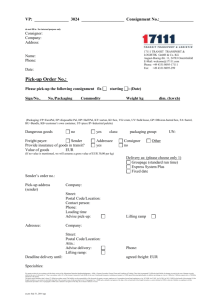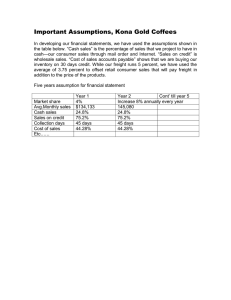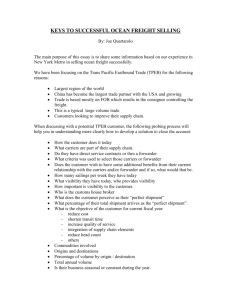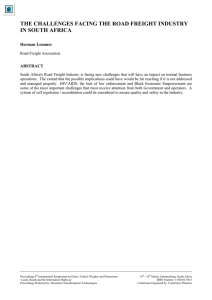SBT - ztv
advertisement
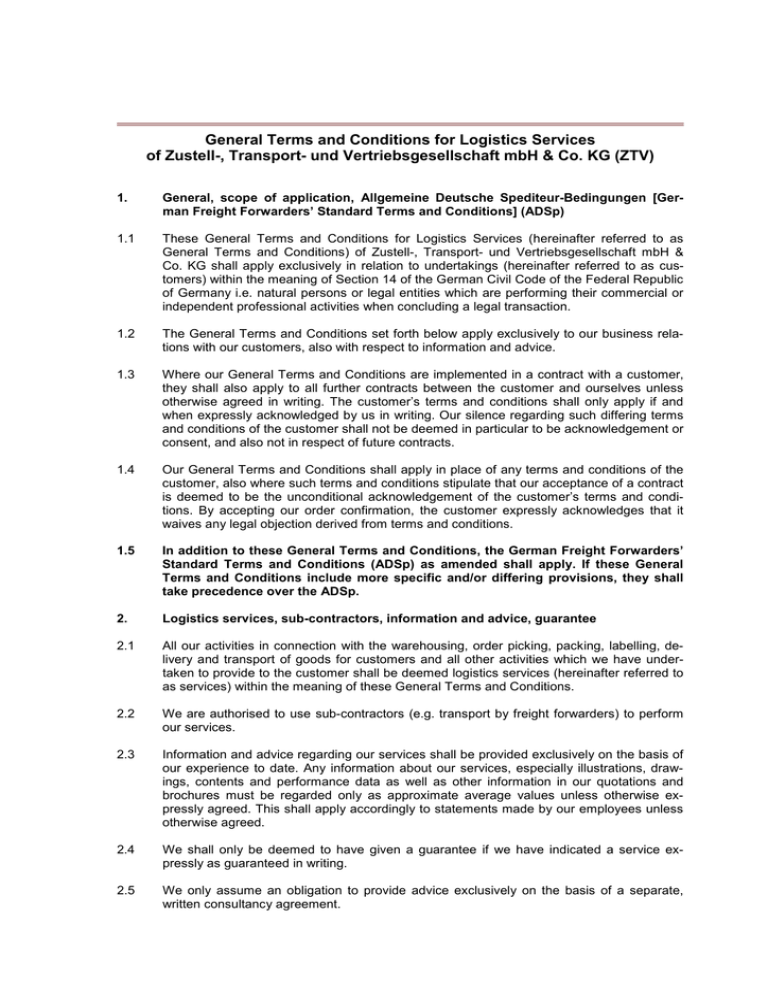
General Terms and Conditions for Logistics Services of Zustell-, Transport- und Vertriebsgesellschaft mbH & Co. KG (ZTV) 1. General, scope of application, Allgemeine Deutsche Spediteur-Bedingungen [German Freight Forwarders’ Standard Terms and Conditions] (ADSp) 1.1 These General Terms and Conditions for Logistics Services (hereinafter referred to as General Terms and Conditions) of Zustell-, Transport- und Vertriebsgesellschaft mbH & Co. KG shall apply exclusively in relation to undertakings (hereinafter referred to as customers) within the meaning of Section 14 of the German Civil Code of the Federal Republic of Germany i.e. natural persons or legal entities which are performing their commercial or independent professional activities when concluding a legal transaction. 1.2 The General Terms and Conditions set forth below apply exclusively to our business relations with our customers, also with respect to information and advice. 1.3 Where our General Terms and Conditions are implemented in a contract with a customer, they shall also apply to all further contracts between the customer and ourselves unless otherwise agreed in writing. The customer’s terms and conditions shall only apply if and when expressly acknowledged by us in writing. Our silence regarding such differing terms and conditions of the customer shall not be deemed in particular to be acknowledgement or consent, and also not in respect of future contracts. 1.4 Our General Terms and Conditions shall apply in place of any terms and conditions of the customer, also where such terms and conditions stipulate that our acceptance of a contract is deemed to be the unconditional acknowledgement of the customer’s terms and conditions. By accepting our order confirmation, the customer expressly acknowledges that it waives any legal objection derived from terms and conditions. 1.5 In addition to these General Terms and Conditions, the German Freight Forwarders’ Standard Terms and Conditions (ADSp) as amended shall apply. If these General Terms and Conditions include more specific and/or differing provisions, they shall take precedence over the ADSp. 2. Logistics services, sub-contractors, information and advice, guarantee 2.1 All our activities in connection with the warehousing, order picking, packing, labelling, delivery and transport of goods for customers and all other activities which we have undertaken to provide to the customer shall be deemed logistics services (hereinafter referred to as services) within the meaning of these General Terms and Conditions. 2.2 We are authorised to use sub-contractors (e.g. transport by freight forwarders) to perform our services. 2.3 Information and advice regarding our services shall be provided exclusively on the basis of our experience to date. Any information about our services, especially illustrations, drawings, contents and performance data as well as other information in our quotations and brochures must be regarded only as approximate average values unless otherwise expressly agreed. This shall apply accordingly to statements made by our employees unless otherwise agreed. 2.4 We shall only be deemed to have given a guarantee if we have indicated a service expressly as guaranteed in writing. 2.5 We only assume an obligation to provide advice exclusively on the basis of a separate, written consultancy agreement. 3. Conclusion of contracts, scope of services, duty to notify 3.1 Our quotations are subject to change and are not binding. They are merely requests to customers to submit their own quotation. A contract is created, therefore, also in day-to-day business, only when we confirm the customer's quotation in writing (also by telefax or email). Our order confirmation shall prevail over the content of the contract. Where we provide a service immediately, our order confirmation can be replaced by our provision of the service. 3.2 All agreements, collateral agreements, assurances and contract amendments shall only be valid when given in writing. This shall also apply to cancellation of this written form requirement. Verbal collateral agreements are void. This shall not affect the precedence of an individual agreement (Section 305 b BGB [German Civil Code]). 4. Customer’s obligations to cooperate 4.1 The customer shall inform us in writing in due time prior to conclusion of the contract of any special requirements of our services. 4.2 The customer shall also provide us without being requested to do so and in due time with all documents and/or information required for the specific execution of our services. 4.3 We shall assume that the information provided and documents handed over by the customer are complete and accurate and shall use them as the basis for executing our services. 4.4 If the customer fails to cooperate as required, fails to do so in due time or fails to do so correctly, the customer shall bear the consequences resulting therefrom (e.g. delays, additional cost). 5. Delivery, delivery time, default in delivery 5.1 Binding delivery dates and delivery periods must be agreed for the delivery of the goods or binding service dates for our customers expressly and in writing as binding. We shall make every endeavour to meet delivery dates and delivery periods that are not binding or approximate (approx., about etc.). We shall deliver the goods to the address stated by the customer. 5.2 A commercial transaction for delivery by a fixed date shall only exist if we have expressly confirmed such transaction in writing or the legal requirements for a commercial transaction for delivery by a fixed date exist. The unilateral designation of a delivery as a commercial transaction for delivery by a fixed date by the customer only shall not be sufficient. 5.3 Delivery periods or service periods shall begin with the customer's receipt of our order confirmation but not before all details relating to the execution of the contract are clarified and all other requirements to be fulfilled by the customer are met. This shall also apply to delivery dates. If the customer requests changes after placing the order, a new delivery period shall begin when we confirm the change. 5.4 If we default in delivery, the customer must first set us a reasonable period of grace to perform the contract. If this elapses without result, the customer can assert the rights stipulated in Sections 280, 281, 284, 286, 323 BGB according to the respective conditions stated therein. Damage claims for breach of duty, for whatever reason, shall only exist as stipulated in paragraphs 10 and 11. If we fail to provide a service on the date or within a period de- Page 2 of 11 termined in the contract, the customer can only rescind the contract if it has bound its interest in the performance to the timeliness of performance in the contract. 5.5 If the customer sets us a reasonable period of grace when default in delivery has occurred, the customer shall be authorised, after expiry of this period of grace without result, to rescind the contract. 5.6 The limitation of liability in paragraph 5.4 shall not apply if a commercial transaction was agreed for delivery by a fixed date (for definition, see paragraph 5.1). 5.7 We shall not be in default as long as the customer is in default in fulfilling obligations towards us; this shall also include obligations under other contracts. 6. Force majeure and other obstructions 6.1 If events of force majeure occur, we shall notify our customer of this in writing in due time. In such case, we shall have the right to postpone our services for the duration of the obstruction, or to rescind in whole or in part that part of the contract not yet fulfilled if we have met our foregoing duty to provide information. Events of force majeure are strikes, lockouts, official intervention, power shortages and shortages of raw materials, company obstructions through no fault of our own e.g. fire, water and damage to machinery and any other obstructions which, when considered objectively, were not caused by our negligence. 6.2 If a delivery date or delivery period is agreed with binding force and the agreed delivery date or the agreed delivery period is exceeded due to events according to 6.1., the customer shall have the right, after a reasonable period of grace has elapsed without result, to rescind that part of the contract not yet fulfilled if the customer cannot be objectively expected to adhere further to the contract. The customer shall have no further claims, especially claims for damages, in such case. 7. Shipment and passing of risk 7.1 If shipment of the goods is delayed for the customer at the customer’s request or due to the customer’s fault, we shall store the goods at the customer’s expense and risk. 7.2 If the delivery is delayed because we assert our right of retention due to the customer's default in payment in whole or in part or due to another reason for which the customer is responsible, the risk shall pass to the customer at the latest as of the date the goods are notified as ready for shipment. 8. Notice of defects, warranty, breach of duty 8.1 The customer must give us notice of any recognisable defects immediately but at the latest 10 days after provision of the service. Notice of defects must include a detailed description of the defect. Failure to give notice of defects in due time shall exclude any claim by the customer for breach of duty due to defective performance. This shall not apply in the case of a fraudulent act by us. 8.2 Notice of hidden defects must be given immediately after they are recognised but at the latest within the limitation period specified in 8.7. Notices of defects must include a detailed description of the defect. Failure to give notice of defects in due time shall here too exclude any claim by the customer for breach of duty due to defective performance. This shall not apply in the case of a fraudulent act by us. 8.3 Notice of defects according to 8.1 and 8.2 must be given in writing. Any notice of defect not given in writing shall also exclude any claim by the customer arising from breach of duty Page 3 of 11 due to defective performance. 8.4 In the event of recognisable defects in shipped goods, the goods subject to complaint must be left in their delivery container so that we can verify the validity of the complaint properly unless we expressly waive this by written declaration, which shall also include telefax, and the customer ensures that the goods subject to complaint are kept separate. 8.5 The customer must give notice in writing immediately of any other breach of duty, setting a reasonable time limit for remedy, before asserting any other rights. 8.6 In the case of defects, the customer's payments may only be withheld to an extent which is proportionate to the defects which have occurred. If the notice of defects is incorrect, we shall have the right to request compensation from the customer for the expenses we incurred as a result. 8.7 In the case of verifiable defects, we shall provide a warranty for a period of one year, calculated from the date on which the period of statutory limitation begins. This shall not apply if we are responsible for fraudulent intent, gross negligence or intent. 8.8 The foregoing limitation period shall also apply to competing claims in tort and to any claims from consequential damage caused by defects. 8.9 Further claims by the customer for or in connection with defects or consequential damage caused by defects, for whatever reason, shall exist only subject to the provisions of paragraphs 10 and 11 unless these are damage claims resulting from a guarantee which is intended to cover the customer against the risk of any consequential damage caused by defects. In this case too, however, we shall be liable only for typical and foreseeable damage. 8.10 Claims by the customer for expenses required to remedy defects, especially transport, road, work and material costs, shall be excluded if the expenses increase because the delivery item is subsequently taken to a place other than the agreed place of delivery. 8.11 Material defects and other breach of duty shall only be accepted when given in writing. 9. Prices, payment terms, objection of uncertainty, lien 9.1 All prices for our services are in principle quoted in euros and exclude value added tax at the legally valid rate which shall be borne by the customer. 9.2 Services that are not part of the scope of our quotation shall be charged on the basis of our respectively valid general price lists. 9.3 We shall have the right to increase prices unilaterally and reasonably (Section 315 BGB) where material procurement costs or production costs, taxes, wage and ancillary wage costs as well as energy costs and costs due to environmental charges and currency regulations and/or charges in customs duties and/or freight rates and/or public charges, if they have a direct or indirect impact on the costs of our contractually agreed services, are increased and if more than four months elapses between conclusion of the contract and provision of the service. An increase for the above purpose shall be excluded if the cost increase for the factors stated is cancelled out by a cost reduction for other factors stated with respect to the total cost charged for the service. 9.4 Our invoices are payable (without deduction) within 10 days. We shall, however, have the right to request payment as and when the service is provided. Page 4 of 11 9.5 We shall have the right, despite the customer’s terms to the contrary, first to set off payments against the customer's earlier debts. We shall inform the customer on how they are set off. If costs and interest have already been incurred, we shall have the right to set off payment first against costs, then interest and finally against the principal payment. 9.6 Once in default, maturity interest of 9 % above the respective base interest rate shall be calculated. This interest shall be lowered if the customer proves that charges are lower; we are permitted to prove that damage is higher. 9.7 Furthermore, if the customer is in default, we shall have the right to retain deliveries resp. services based on all contracts with the customer until the customer meets all obligations in full. The customer can avoid this right of retention by providing a directly enforceable guarantee from a major German bank unlimited in time or from a public-sector financial institution linked to the deposit insurance fund for the amount of all our due claims. 9.8 The date payment is received by us or credited to our account shall be deemed the payment date. We reserve the right to assert damage in excess of this. Furthermore, default in the fulfilment of one claim shall cause all our other claims from the business relationship to become due immediately. 9.9 If payment terms are not met by the customer or circumstances known or recognisable that in our proper commercial judgement give rise to justified doubt about the customer's creditworthiness, also including such facts that existed when the contract was concluded but which were unknown to us or did not have to be known to us, we shall have the right, notwithstanding further statutory rights in such cases, to cease further work on current contracts and to request advance payments or the provision of objectively appropriate securities for services still outstanding and, after expiry of a reasonable period of grace to provide such securities without result, to rescind the contract, irrespective of other statutory rights. The customer shall be obliged to reimburse us for all damages incurred by the nonperformance of the contract. 9.10 The customer shall have a right of retention or right of set off only regarding those counterclaims that are not disputed or have been recognised by declaratory judgment. A right of retention may only be exercised by the customer to the extent that its counterclaim is based on the same contractual relationship. 9.11 We shall have a lien and a right of retention to the goods over which we have power of disposal or other assets which have been provided to us by the customer or a third party authorised by the customer in respect of all claims which are due and not due, to which we are entitled from the customer for our services. 10. Liability as freight forwarder according to the German Freight Forwarders’ Standard Terms and Conditions (ADSp) 10.1 We are liable as freight forwarder in particular for destruction, loss, damage or delay only according to the German Freight Forwarders’ Standard Terms and Conditions (ADSp). 10.2 In this respect, Arts. 22 to 29 ADSp stipulate the following: 22. Liability of the freight forwarder, assignment of claims for damages 22.1 The freight forwarder shall be liable for all its services (paragraph 2.1 ADSp) according to legal regulations. Unless otherwise determined by mandatory legal regulations or legal regulations stipulated in general terms and conditions, the following provisions, however, shall apply. Page 5 of 11 According to paragraph 2.1 ADSp, the ADSp apply to transport contracts for all types of activities, irrespective of whether they relate to forwarding, freight, warehousing or other transactions which are customary in freight forwarding business. These also include logistics services customary in forwarding if they are connected with the carriage or warehousing of goods. 22.2 If the freight forwarder is only responsible for concluding the contracts required for providing the contractual services, the freight forwarder is liable only for its careful choice of the third party service providers. 22.3 In all cases where the freight forwarder is liable for loss of or damage to goods, the freight forwarder’s liability shall be in accordance with Sections 429, 430 HGB [German Commercial Code]. 22.4 If Sections 425 et seq. and 461 (1) HGB do not apply, the freight forwarder shall be liable for damage resulting from 22.4.1 inadequate packaging or marking of the goods by the principal or third parties; 22.4.2 agreed or customary outdoor storage; 22.4.3 aggravated theft or robbery (Sections 243, 244, 249 StGB [German Penal Code]); 22.4.4 force majeure, weather conditions, failure of appliances or wiring, influence of other goods, damage by animals, natural changes in the goods; only if there is evidence of the freight forwarder being at fault. If the damage could have arisen from one of the above circumstances, it shall be deemed to have arisen from it. 22.5 If the freight forwarder has a claim against a third party for damage for which the freight forwarder is not liable, or if the freight forwarder has claims for damages in excess of the sum for which it is liable, the freight forwarder must assign such claims to its principal at the principal’s request unless the freight forwarder, by special agreement, has undertaken to pursue such claims at the expense and risk of the principal. The principal may also request that the freight forwarder assigns all claims against third parties to the principal by way of performance. This shall not affect Section 437 HGB. If the principal’s claims have been met by the freight forwarder or satisfied by the freight forwarder's liability insurance, the claim to be assigned shall be limited to that portion of the claim against third parties which exceeds that already paid by the freight forwarder or the insurance. 23. Limitation of liability 23.1 The liability of the freight forwarder for loss of or damage to goods, with the exception of warehousing upon instruction, is limited in amount 23.1.1 to € 5 per kilogram of gross weight of the consignment; and to a maximum of € 1000 for each parcel in case of parcel consignments; and Page 6 of 11 to a maximum of € 2.500 for each consigment in case of valuable consignments (valuables); and up to 40 SDR per kg, in case a written agreement with the pricipal has been concluded in that respect. 23.1.2 in case of damage occurring to goods whilst being carried, contrary to section 23.1.1, to the legally stipulated maximum amount of liability specified for this type of carriage; 23.1.3 in case of a transport contract of multi-modal carriage, including sea transport, contrary to 23.1.1, to 2 SDR per kg; 23.1.4 to a maximum amount of EUR 1 million or 2 SDR per kg per claim, whichever is higher. 23.2 If only individual packages or parts of the consignment were damaged or lost, the maximum liability is calculated on the basis of the gross weight - of the whole consignment if it is rendered valueless; - of that part of the consignment if only part of the consignment is rendered valueless. 23.3 The liability of the freight forwarder for damage other than to goods, excepting personal injury and damage to third-party goods that are not the subject of the transport contract, is limited to three times the amount payable for the loss of the goods, but not more than EUR 100,000 per claim. This shall not affect Section 431 (3) and 433 HGB. 23.4 The liability of the freight forwarder, irrespective of the number of claims per event is limited in any case to EUR 2 million per occurrence of loss or 2 SDR per kg of lost and damaged goods, whichever is higher; in the case of more than one claimant, the freight forwarder's liability shall be proportionate to their individual claims. 23.5 The SDR is calculated in accordance with Section 431 (4) HGB. 24. Limitation of liability in the case of warehousing upon instruction 24.1 The liability of the freight forwarder for loss of or damage to goods in the case of warehousing upon instruction is limited 24.1.1 to € 5 for each kg gross weight of the consignment; 24.1.2 to a maximum of EUR 5,000 per claim; if the claim of a principal is based upon the difference between the nominal and actual inventory (15.6) the liability is limited to EUR 25,000, irrespective of the number of claims causing the inventory discrepancy. This shall not affect Section 24.1.1 in either case. 24.2 Section 23.2 applies accordingly. 24.3 In the case of warehousing upon instruction the liability of the freight forwarder for claims other than for damage to goods, excepting personal injury and damage to goods that are not the subject of the transport contract, is limited to EUR 5,000 per claim. 24.4 Irrespective of the number of claims arising from an occurrence of loss, the Page 7 of 11 liability of a freight forwarder is limited in any case to EUR 2 million per occurrence of loss; in the case of more than one claimant, the freight forwarder's liability shall be proportionate to their individual claims. 25. Burden of proof 25.1 The principal must provide proof in case of a claim that goods of a specified quantity and condition were delivered to the freight forwarder without visible external damage (Section 438 HGB). The freight forwarder must prove that it delivered the goods as it received them. 25.2 The burden of proof that goods were damaged whilst being conveyed (paragraph 23.1.2) by a means of transport lies with the party claiming such damage. If the place where the damage occurred is unknown, the freight forwarder must, at the request of the principal or consignee, specify the sequence of transportation by documenting the interfaces (paragraph 7 ADSp). It is to be assumed that the damage occurred during that stage of the transportation for which the freight forwarder cannot provide a receipt without reservation. 25.3 The freight forwarder is obliged to ascertain, through appropriate enquiries and obtaining evidence, where the asserted damage occurred. 26. Claims not arising from freight forwarding contracts The above-mentioned releases from and limitations of liability shall also apply, according to Sections 434, 436 HGB, to claims not arising from freight forwarding contracts. 27. Qualified fault The above-mentioned releases from and limitations of liability shall not apply, if the damage was caused 27.1 by intent or gross negligence of the freight forwarder or its executives or by violation of material contractual obligations, in which case claims for damages shall be limited in the latter case to typical, foreseeable damage; 27.2 by the freight forwarder in cases covered by Sections 425 et seq., 461 (1) HGB or by persons specified in Sections 428, 462 HGB acting with intent or recklessly and in the knowledge that damage would probably result. 28. Notification of claims Claims have to be notified according to Section 438 HGB. 29. Freight forwarder’s liability insurance 29.1 The freight forwarder is obliged to conclude a liability insurance at market conditions with an insurer of its choice and maintain this insurance which shall cover its transport-related liability according to the ADSp and as legally required to cover regular indemnity limits. 29.2 Agreement of a maximum compensation per claim, occurrence of loss and year is permitted. The agreement of a contribution from the freight forwarder is also permitted. Page 8 of 11 29.3 The freight forwarder may only invoke the ADSp with respect to its principal if the freight forwarder has provided for sufficient liability insurance cover when the forwarding instructions are issued. 29.4 At the request of the principal, the freight forwarder shall provide proof of this liability insurance cover by confirmation from the insurer. 11. Liability outside the scope of application of the ADSp, exclusion and limitation of liability 11.1 Outside the scope of application of our liability as freight forwarder according to paragraph 10 above, we shall be liable in principle only for intent and gross negligence by ourselves and our legal representatives and vicarious agents. Our liability and that of our legal representatives and vicarious agents for slight negligence shall, therefore, be excluded except in the following cases: (a) violation of material contractual obligations; (b) if, in the event of violation of obligations within the meaning of Section 241 (2) BGB, it is no longer reasonable to expect the customer to accept our service; (c) in the event of injury to life, limb and health; (d) where we have assumed a guarantee for the quality of performance, for the existence of successful performance; (e) fraudulent intent, (f) initial impossibility; (g) claims under the Produkthaftungsgesetz [German Product Liability Act]; or (h) other cases of liability prescribed by law. “Material contractual obligations” are obligations that protect the legal positions of the customer which are material to the contract and which have to be granted to the customer under the contract in terms of subject matter and purpose. Material contractual obligations are also obligations, the fulfilment of which makes the due performance of the contract possible in the first place, where the customer regularly relies on and may rely on compliance with such obligations. 11.2 We shall be liable only for typical and foreseeable damage unless we are reproached for intentional breach of duty or a case of injury to life, limb and health or other cases of liability prescribed by law. 11.3 Liability for indirect damages and consequential damage caused by a defect shall be excluded unless we have violated a material contractual obligation or we, our executives or vicarious agents are reproached for intentional or grossly negligent breach of duty or a case of injury to life, limb or health exists. 11.4 Liability for damage other than the liability stipulated in the above paragraphs shall be excluded irrespective of the legal nature of the asserted claim. This shall apply in particular to damage claims arising from negligence when concluding a contract, due to other breach of duty or due to claims in tort for compensation for property damages according to Section 823 BGB. Page 9 of 11 11.5 Exclusion resp. limitation of liability according to the foregoing paragraphs 11.1 to 11.4 shall apply to the same extent for the benefit of executives and non-executive employees and other vicarious agents as well as our sub-contractors. 11.6 Claims by the customer for damage from this contractual relationship may only be asserted within a preclusion period of one year as of commencement of the statutory limitation period. This shall not apply if we are culpable of fraudulent intent, gross negligence or intent and in the case of a claim arising from tort. 11.7 There is no connection between the reversal of the burden of proof and the foregoing stipulations. 12. Confidentiality 12.1 The customer undertakes to keep confidential such facts, documents and knowledge of which the customer becomes aware in the course of performing the contract with us, and which contain technical, financial, business or market-related information about our company, if we have specified that the respective information must be kept confidential or we have an obvious interest in its confidentiality (hereinafter referred to as a whole as “confidential information”). The customer shall use the confidential information exclusively for the purpose of implementing and performing the contractual relationship with ourselves in accordance with the contract and the individual contracts based on this. 12.2 The customer shall oblige its personnel who process or have access to the confidential information to maintain confidentiality in a comparable and best possible way. Disclosure of confidential information to third parties by the customer shall require our express and prior written consent. 12.3 The obligation of confidentiality according to paragraph 12.1 above shall not exist if it is proven that the respective confidential information: (a) is state of the art in the public domain or this information becomes state of the art without any action by the customer; or (b) was already known to the customer or is disclosed by a third party authorised to disclose it; or (c) is developed by the customer without any action by us and without exploitation of other information or knowledge acquired through the contractual contact; or (d) must be disclosed due to compulsory statutory provisions or orders by a court or official authority. 12.4 The obligation of confidentiality shall also survive termination of the business relationship but only until the information enters the public domain without violation of an obligation of confidentiality. 13. Place of performance, jurisdiction, applicable law 13.1 Place of performance for all contractual obligations is Krefeld. 13.2 Exclusive place of jurisdiction for all disputes is also Krefeld. Page 10 of 11 13.3 All legal relations between the customer and ourselves shall be governed exclusively by the law of the Federal Republic of Germany but to the exclusion of the UN Sales Convention. 14. Institution of insolvency proceedings, suspension of payments A petition to institute insolvency or composition proceedings against the customer or the customer's suspension of payments not based on rights of retention or other rights shall entitle us to rescind the contract at any time or make the services to be provided dependent on the prior fulfilment of the payment obligation. If the services were already provided, remuneration shall be due immediately in the above-mentioned cases. 15. Amendments to terms and conditions The customer shall be notified in writing of any amendments to these General Terms and Conditions. They shall be deemed approved by the customer unless the customer objects to them in writing in due time. We must make special reference to this legal consequence in our amendment notification. The customer must send its objection to us within four weeks of receiving the amendment notification. Note: According to the provisions of the Bundesdatenschutzgesetz [Federal Data Protection Act], we draw attention to the fact that our company is managed by means of EDP equipment, and that we also in this respect store data received as a result of the business relationship with the customer. Zustell-, Transport- und Vertriebsgesellschaft mbH & Co. KG, Krefeld, Version 150810 Page 11 of 11
